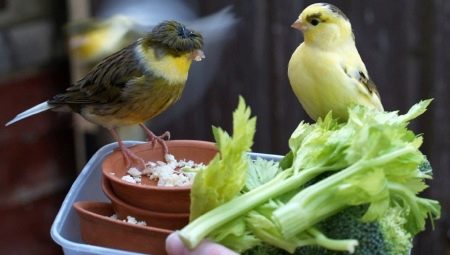Singing canaries, according to some experts, has a relaxing and calming effect.
In order for this bird to feel healthy, cheerful and constantly delight its owner with intricate songs, it is necessary to provide it with a full and balanced diet.
What and how to feed canaries at home, we will consider in the article.
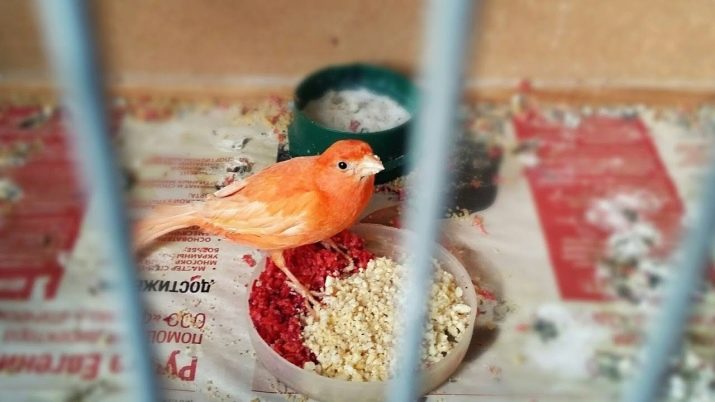
Allowed Products
Properly selected fruits, vegetables and crops not only have a positive effect on the canary organism, but also improve the mood of these birds, make them more sociable and curious.
As a rule, experienced breeders of these amazing birds tend to choose just natural food of plant or animal origin.
The advantage of such nutrition, unlike ready-made feeds, is that the owner can independently control the composition of the feed, add vitamins or fresh berries / fruits to it at any time. The complexity of this method the need to constantly monitor the vitamin balance, as well as in continuous work with portions of certain foods.
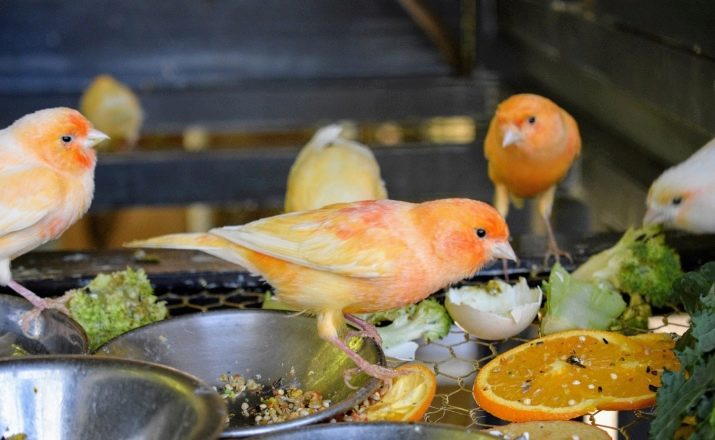
Let's look at the lists of allowed products of plant and animal origin in feeding canaries.
Let's start with plant foods - nutrition with the addition of grains, vegetables, fruits, bran and seeds.
Cereal feed
Most often they are served in the form of a mixture of several crops. The most popular grain-type feeds are: corn (the share in the total feed is about 20%), oats (ideal for molting or nesting - from 9 to 13%), millet (an irreplaceable product in any season - no more than 6%), buckwheat (as a cereal in milk with crushed seeds), wheat (soaked grains are an indispensable source of vitamin E and B1), rice (in small doses in case of gastrointestinal problems), bran, peas and semolina (as components of mashed vegetables or cereal on water based).
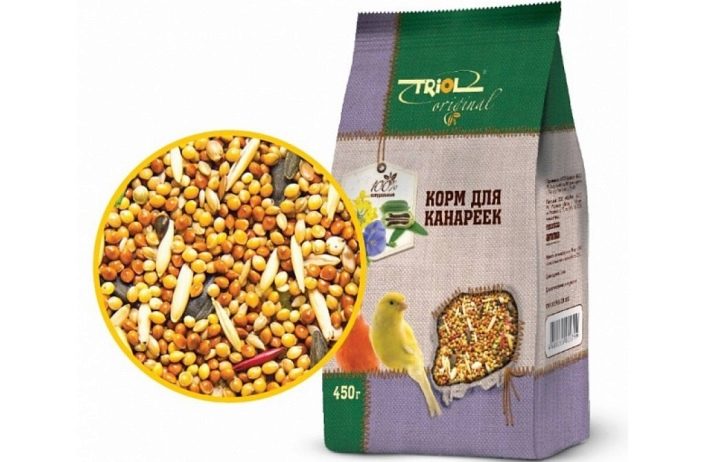
Nuts
In the wild, the canary diet is about 10% seasonal nuts.
At home, this is most often just a walnut, which should be served chopped into a common feed.
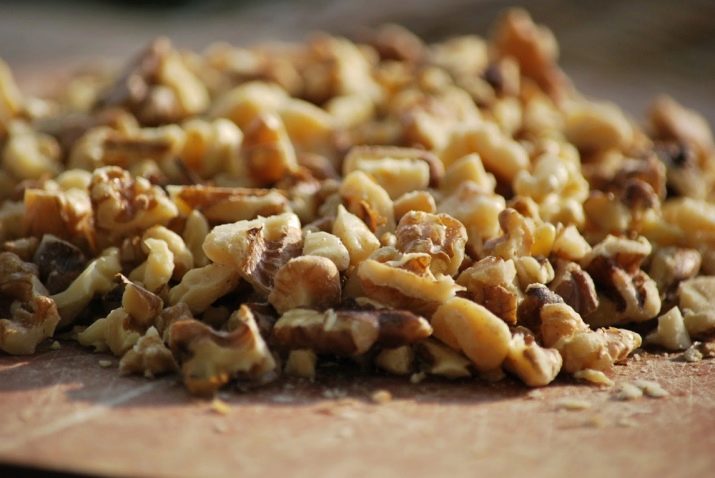
Seeds
At least 40% of the diet in most varieties of canaries is rapeseed seeds. In addition, seeds of spring colza, young seeds of bulbous plants (plantain, sow thistle, quinoa and timothy grass), seeds of vegetable crops (white cabbage, pumpkin, squash) should participate in the feeding of birds; seeds of agricultural crops (hemp, poppy seeds), as well as some seeds of legumes (beans, lentils and peas).
Sometimes it will be useful to add fatty plant seeds (almonds, peanuts or sunflower seeds) to the menu, but you should not overdo it with them.
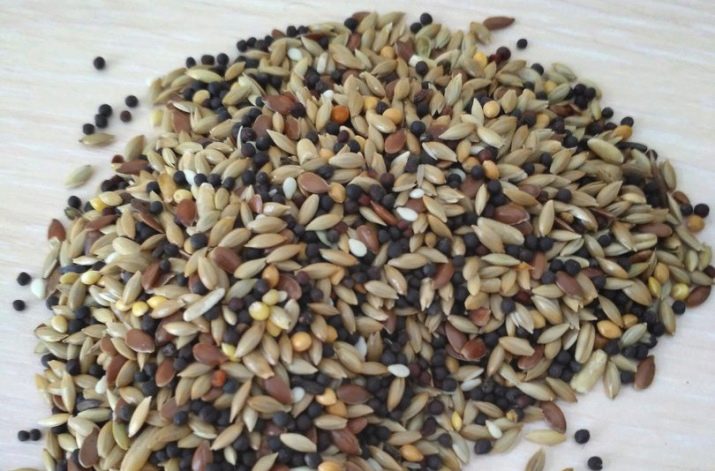
Fruits and vegetables
In the wild, canaries often eat seasonal fruits and vegetables, but at home, this food should be alternated with the main feed. Speaking of fruit, canaries prefer apricots, apples (sweet) and cherries (pitted).
Good help will be juices and mashed potatoes from these fruits, as well as dried fruits.
From vegetables, these birds eat boiled or fresh carrots, beets and cabbage leaves.
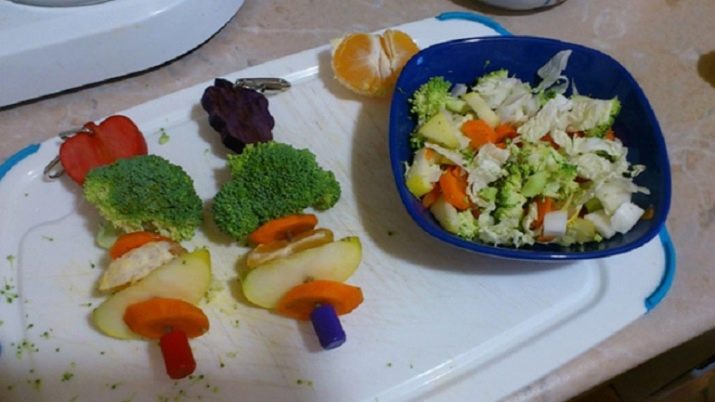
Food of animal origin is extremely saturated with healthy proteins and amino acids, and therefore is vital in the nutrition of these birds.
Such food should be given separately from vegetable, and feeders with such food should be washed regularly.
- Boiled egg: protein and yolk are some of the key elements of animal origin in the feeding of these birds. A huge amount of minerals, vitamins and protein is concentrated in them.
- Low fat cottage cheese - Ideal for protein-deficient birds. Cottage cheese belongs to those few products that are absorbed by almost 100%.
- In small doses, canaries are advised to give honey (necessarily natural), it is possible both in liquid and in solid form. For some varieties of canaries, honey is an essential element of the daily diet. It positively affects the digestive tract, has restorative and firming properties (especially relevant for young chicks or individuals during molting and nesting).
- Fish fat - universal prophylactic in any period, especially useful during the breeding and feeding of chicks. One to two drops of fat is given per teaspoon of feed.
- Some breeders prefer feeding canaries to insects, however, under normal conditions, this is impractical due to the price and storage characteristics of such food.
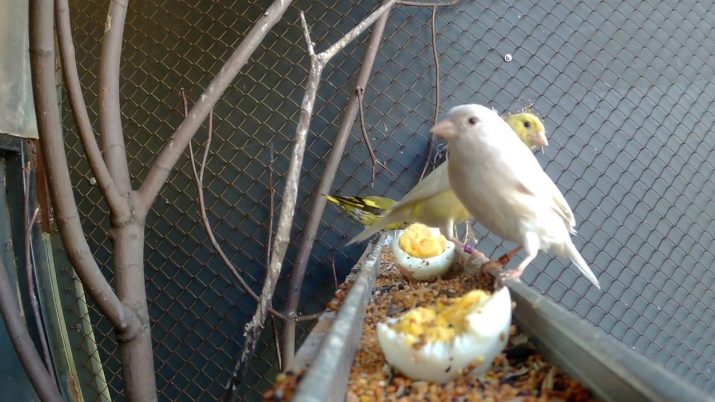
Finished feed
Many owners, when considering the best ways to feed canaries, focus on ready-made mixes and purchased feed options. This choice is easy to explain - such nutrition is balanced in advance, does not need any vitamin supplements or mixing.
The most popular brands on the canary market are Padovan, Vitakraft, Fiory, Rio, Vitapol, Triol, Prestige.
Among budgetary Russian manufacturers, one can distinguish a brand "Native food." Its products consist of such important vegetables and cereals as flax, carrots, canola, millet (red and yellow), hemp and canary seeds.
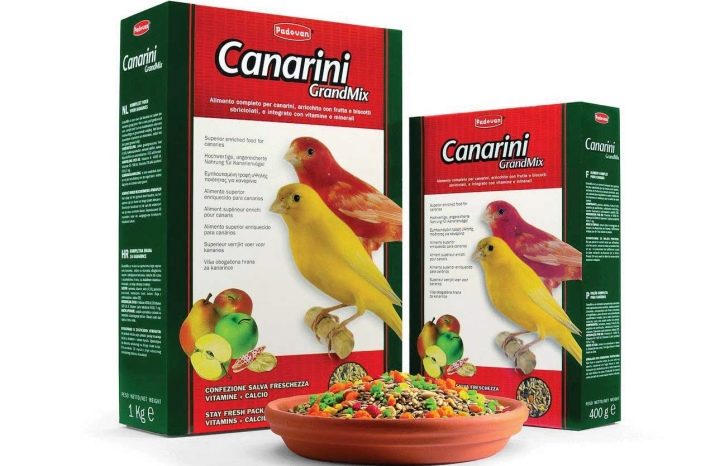
When choosing ready-made mixes in the store, you should pay attention to several factors.
- Tightness - The main requirement for feed sold in packages. It is undesirable to buy feed “by weight” - all of them are usually stored in large unventilated containers, where they can become moldy or simply deteriorate.
- Carefully inspect the packaging elements - it should be written verbatim that the food was made exclusively for canaries. There are several varieties of canary food: “for saturation of the color of plumage”, “for stimulation and improvement of singing”, “during molting or nesting”, as well as “for daily feeding”.
- Read the feed instructions - this way you can find out the daily feed rates for your pet, get acquainted with the composition of the product (which is extremely useful for individual intolerance to poultry) and its shelf life.
Unfortunately, even premium canary foods, which are very expensive, do not always have all the necessary vitamin elements for the full functioning of the canary organism.
That is why the breeders of these birds recommend from time to time to mix some foods of various brands or add additional elements (sunflower seeds or mashed buckwheat) to certain mixtures.
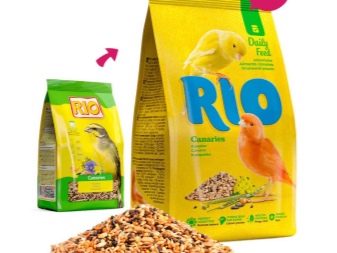
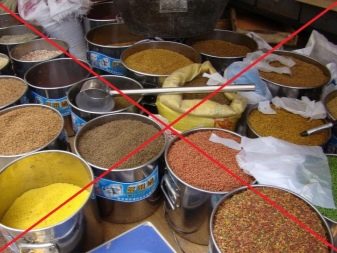
Can compounds be given for other birds?
Today in pet stores it is much easier to find ready-made food for the same parrot than for canaries, and therefore many owners decide to stay on them.
It is worth noting immediately that this is a huge mistake that can end fatally.
Food for canaries and parrots have a completely different vitamin composition and are otherwise balanced. In the parrot food, canaries will not find many of the components that are vital for the proper functioning of their digestive system.
The most common diseases that can occur with such a diet are obesity, gastrointestinal problems and severe allergic reactions.
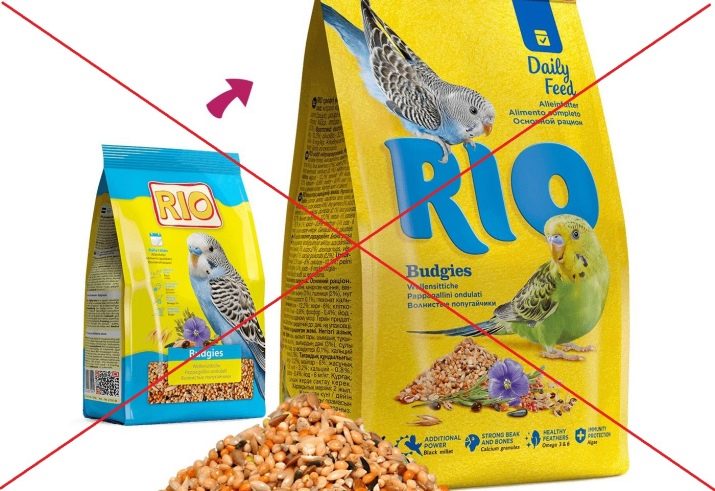
Forbidden food
The body of canaries is capricious about many seemingly harmless vegetables, fruits and plants. Below you will find a list of products that canaries should not be given even occasionally and in small doses.
- Fruits and berries high in fat, glucose and sugar. First of all, it is grapes and raisins, mangoes (harmful to absolutely all feathered pets), avocados and persimmons. These products interfere with the proper functioning of the gastrointestinal tract of canaries.
- All herbs are spicy type: parsley, dill, celery, cilantro. These plants cause very severe allergies in canaries.
- Plants containing tannins: branches of oak, pear and bird cherry.
- Absolutely all conifers - due to the high content of resin components.
- Canaries should especially be protected from poplar branches - from them in these birds in the body accumulate toxins.
- A separate danger is all types of garden berries with seeds: cherry, cherry, apricot and peach. The flesh of the seeds of these berries also contains an increased dose of toxins.
- Of vegetables, a strict ban applies only for potatoeswhich is too high in starch.
- In no case should you drink the usual canary hard and unfiltered water. Such water contains a huge percentage of undesirable salts.

Vitamin and Mineral Supplements
Feeding canaries can not do without vitamin and mineral supplements. In the dwelling of this bird all the time there should be such mineral-rich substances as charcoal, sepia, chalk, eggshells, river sand and clay. If we talk specifically about medicines and strengthening agents, then here for canaries glucose, gluconate or calcium lactate in tablets will be very useful.
All minerals, regardless of which option you choose, should be grinded or ground, then added to the daily portion of feed or cereal.
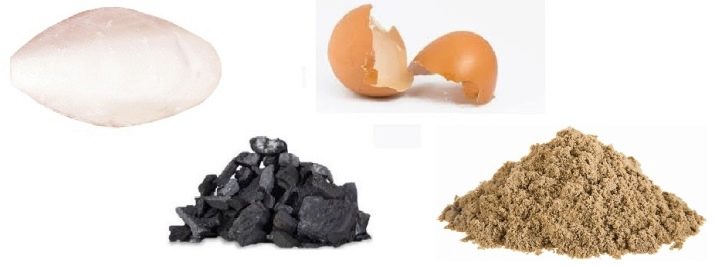
Some owners resort to the creation of special fortified tiles, which serve as a constant source of vitamins for the bird in the cage.
Such tiles can be quickly made independently.
Here is a table with the main ingredients for making the most useful and simple vitamin tile.
Item name | Serving (in grams) |
Base (clay) | 550 |
Eggshell | 150 |
River sand (sanitized) | 150 |
Charcoal (ash) | 50 |
Calcium Glycerophosphate | 30 |
a piece of chalk | 20 |
Salt (table) | 20 |
Bone flour | 10 |
All ingredients should be thoroughly grated or ground in one container, then gradually add warm filtered water until a homogeneous composition with the consistency of the dough is obtained.Put the mixture on a flat surface with a layer of 1 cm and mark the zones of 3x3 cm squares on it. Next, using a knife, cut out the squares and place them in a warm and well-lit place for 1.5-3 weeks for drying.
So that later it was convenient to feed these small squares to the bird in a cage, you need to fasten them to improvised metal hooks before drying. One such canary square should be enough for a whole month.
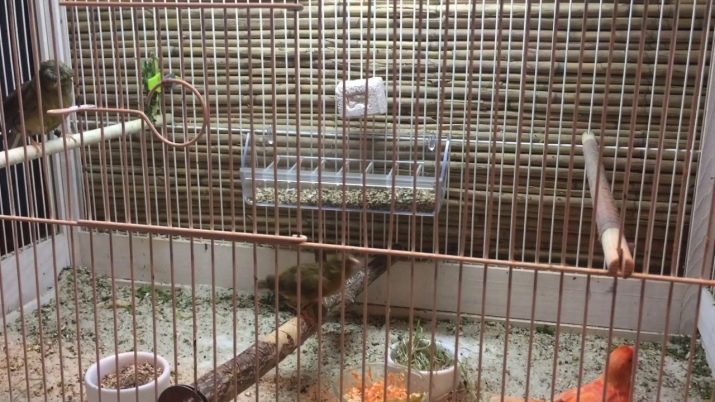
If your canary’s diet includes only cereal or seed feed, you should sometimes enrich with herbal supplements from fresh plants. This will not replace a full-fledged vitamin diet, but it will perfectly enhance your pet's health in the cold seasons.
If we are talking about summer vitamin plants, then you can occasionally add to the food for canary: cross, leaves of dandelion (young), wormwood, primrose, chicory, young nettle leaves, leaves of asterisk medium (or woodlice), sorrel, salad.
Extremely useful vegetable crops (plant tops) will be carrots and beets.
In winter, the body of the canary can also not do without vitamin supplements, it is during this period that the body of these birds is most at risk for colds. Here, the best option would be to add to the feed a mixture of dried and previously soaked in summer water plants. Besides, it will be useful to occasionally add a few drops of lemon juice to the main feed.
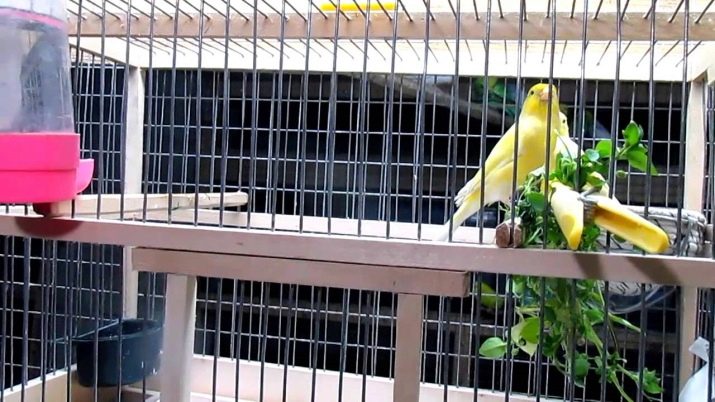
Soaked fruit in winter will be an excellent substitute freshly bought dried fruits and berries. The most popular options for canaries are apple, apricot, pears, mountain ash, cherry (seedless), wild rose, tangerines, melons and kiwi, dried apricots, prunes. Of the seeds, dried apple or pear is best.
If you are an enthusiast and prefer some special food for your canary, you can occasionally prepare vitamin purees from berries, fruits and vegetables (cabbage, beets, carrots, tomatoes), as well as compotes or juices that are low in sugar.
By the end of winter and the beginning of spring, young branches (with buds and leaves) of such shrubs and plants as elderberry, viburnum, apple tree, currant, willow, linden, birch, ash, beech, and mountain ash will be a wonderful vitamin seasoning for food.
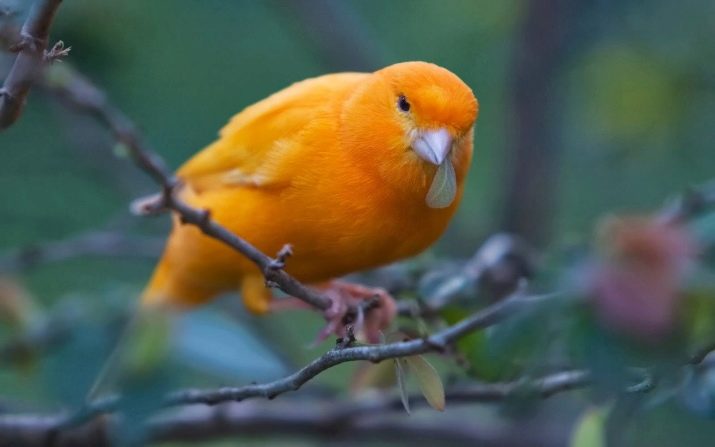
Feeding rules
Summarizing all the above, you can make a short list of basic rules for feeding canaries at home.
Balance
If you have not previously been involved in breeding canaries, start with ready-made feeds - they have the necessary vitamins for the life of this bird. Any canary, regardless of its type or age, is needed for good nutrition carbohydrates (which are found in abundance in grains, seeds and fresh herbs), proteins (animals), fats (from nuts and seeds) and vitamins.
For a more complete and healthy diet, you will have to learn how to prepare vitamin mixtures from these elements yourself.
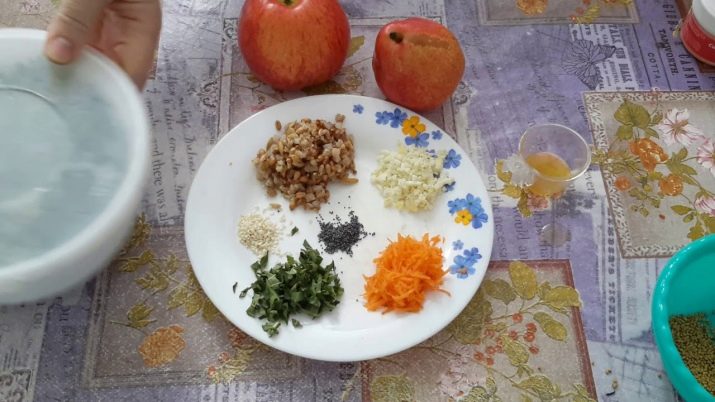
Timeliness
Feed the canary should be about the same time - most often 2 times a day (you can serve vegetable and fruit crops in a cage throughout the day, the bird will determine the norm of this food for itself).
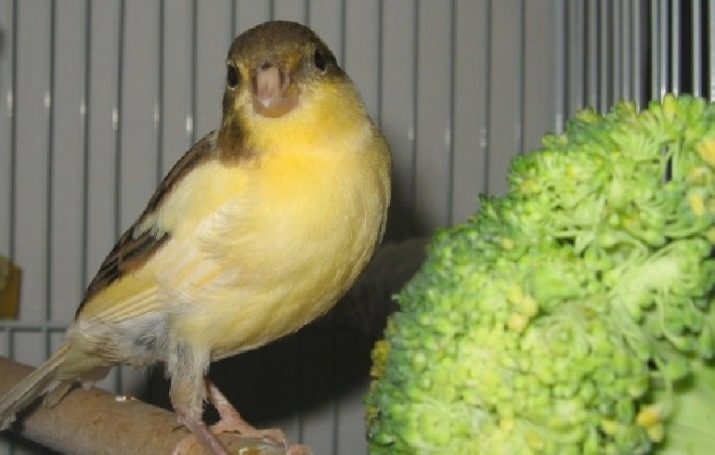
Water
It is considered a key element in feeding these songbirds. Canaries love to drink water and swim in it. A drinker with fresh and clean filtered, settled or boiled water should be in the pet's house all day. The temperature level of water should fluctuate around +22 degrees Celsius.
In addition, special bottled water specifically for birds can occasionally be found in pet stores.
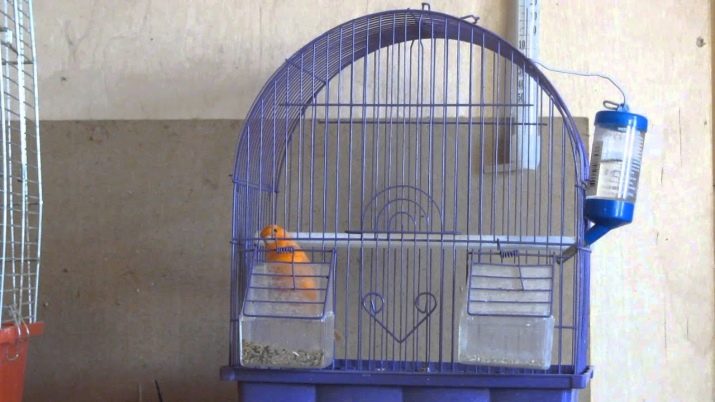
Portions and Norms
Unfortunately, it is difficult to immediately determine the daily diet for canaries. It depends on the type of canary, its age, as well as the state of health. All this can only be determined empirically - just keep track of how much bird leaves food after eating.
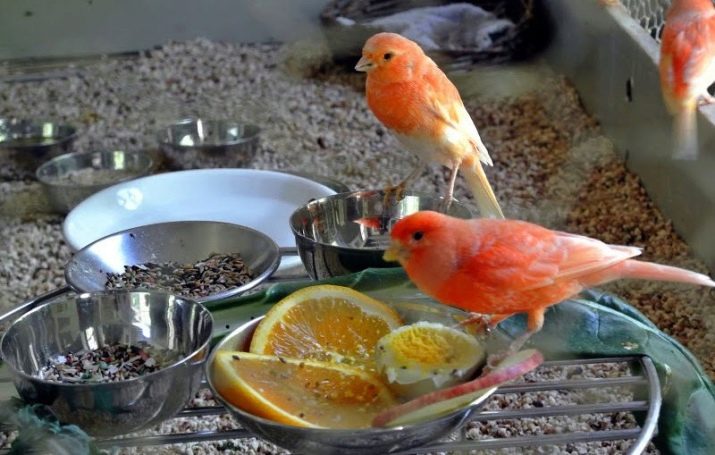
Vitamins
With the amount of vitamins or the frequency of their supply, the canary should not be overdone, it will only harm the health of the pet and upset the balance of the diet.
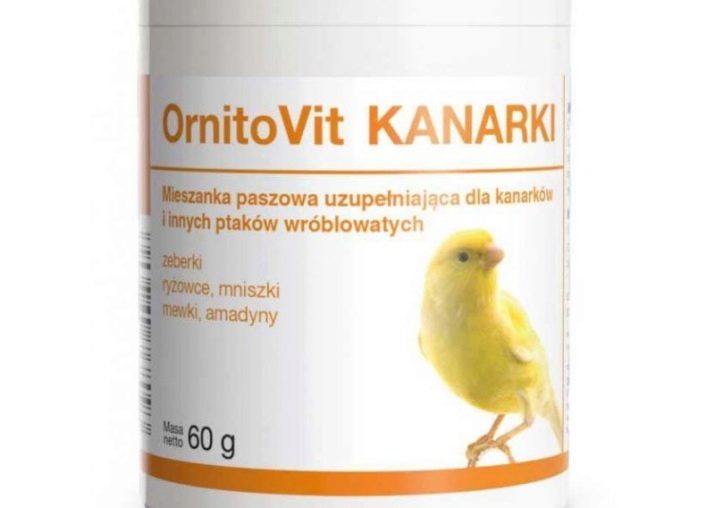
Cleanliness and hygiene
Canaries are cleanlings who really dislike mess and dirty, spoiled food in their cages. Under such conditions, these birds can completely lose their appetite and develop serious diseases. Moreover, from eating spoiled foods, these birds can simply be poisoned.
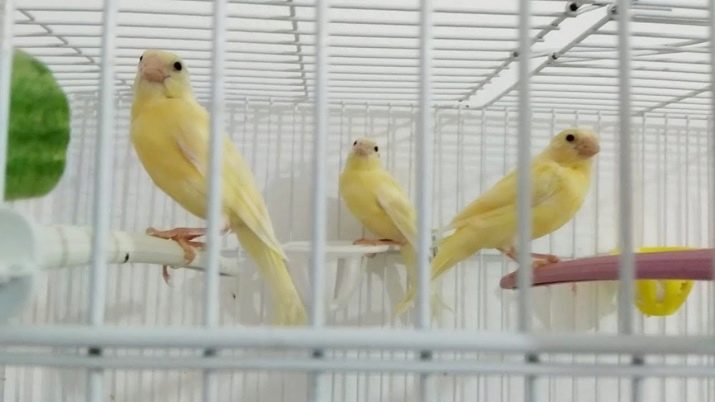
Periods of molting, nesting and feeding
During these periods, the canary needs your increased attention. It is most effective at this time to buy specialized feed, as well as constantly supply the diet with fresh twigs, berries and fruits.
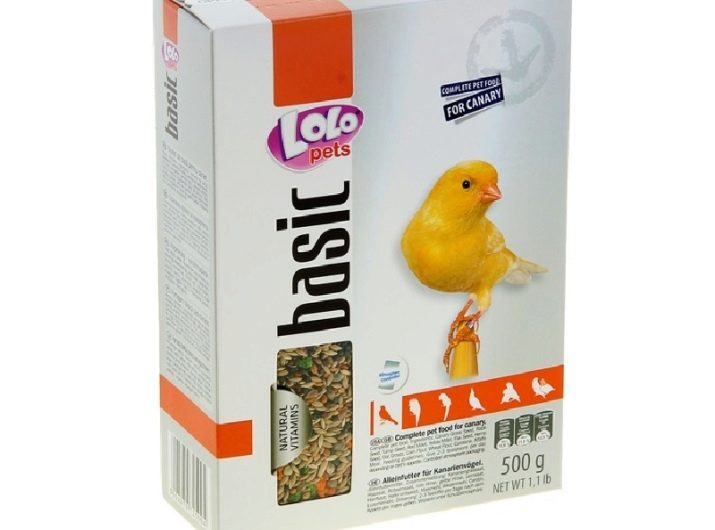
The features of the autumn feeding of canaries can be found in the next video.
